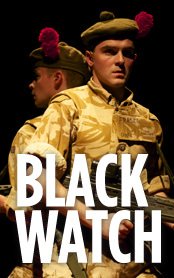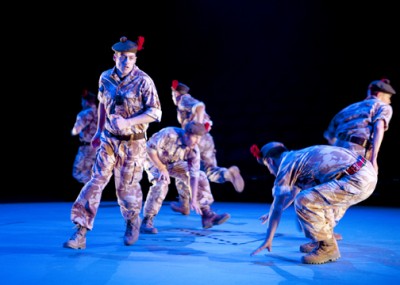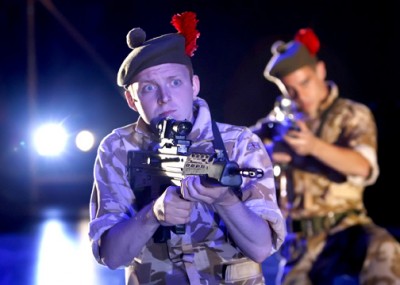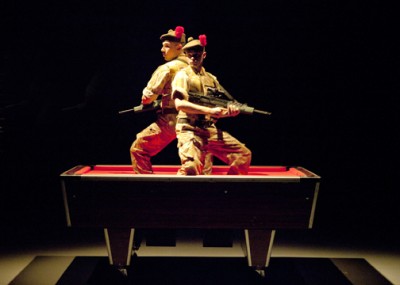Black Watch
 Written by Gregory Burke
Written by Gregory Burke
Directed by John Tiffany
At Broadway Armory
An audaciously theatrical look at antique honor inserted into modern warfare.
There’s a particularly lovely piece of choreography (by Steven Hoggett) about one-third the way into Black Watch. A kind of pas de deux occurs between a soldier (Ryan Fletcher) and the history of his famous Scottish regiment. As he paces back and forth along the long red carpet of the past, his fellow performers dress and undress him in the various uniforms of the Black Watch as he recites a litany of battles that his compatriots fought in their 300 year history. This is a critical montage that underlies what makes the viewpoint of those in the Black Watch compelling as they look back to their time in Iraq. What happens when centuries of tradition butt against modern-day controversy? In the National Theatre of Scotland’s Black Watch, the true stories of several soldiers are woven into a visually exciting and emotionally resonant production.

Perhaps inserting himself into the story, writer Gregory Burke introduces a timid reporter (Robert Jack) entering a den of young Black Watch vets as they relax in a pool hall. He’s there to interview them and become the audience’s inquisitive avatar and whipping boy. We drift back and forth from the pool hall to their time in Basra and the Triangle of Death. For the men of The Black Watch, war isn’t hell, it’s a sport. The honor of the regiment is at risk, for how is it sporting to be the invading—not defending—force? They’ve often been used to put down tribal uprisings, for they consider themselves a tribe unto themselves. Now they find themselves political pawns, with little nobility in the machinations of people far removed from the on-the-ground experience. Calls to honor, family tradition, and sacrifice are in steep conflict with a need to eke out a living in a rough economy. Fraternal bonds endure, however, and bolster them in the tedium of service in a strange foreign land. They fight for each other. Few other agendas supercede that devotion. Lovably crude, they are put to the test in a way their forebearers never could have foreseen. Some will leave, a few will perish, some will return fractured in body or soul.
This is a remount of the National Theatre of Scotland’s extremely successful 2011 visit and is here for 11 days only. Staged again with cinematic scope at the Broadway Armory with the help of Chicago Shakespeare’s World Stage series, I couldn’t help but feel this would be more at home at Lookingglass, where the acoustics are a bit less prone to echo. The biggest drawback of this show is the often unintelligible Scottish accent and parlance, and that echoing doesn’t help. Thankfully the gorgeous musical numbers aren’t lost in the cavernous recesses of the Armory, adding a poignant grace note that plays chillingly off the sounds of mortars and gunfire. Not every sequence is perfect, but the culminative effect is still compelling. Humor certainly plays another role; the kind of a rollicking juvenility that makes the blackness bearable.

Melding pageantry with pathos, Black Watch is a compelling look at the kind of St. Crispin’s-style camaraderie that still imbues soldiers today even as it struggles to survive the cynicism of the 21st century. While it may be next to impossible for a non-native to comprehend every word spoken by the talented troupe, there’s no doubting their sincerity and skill in bringing these stories to life. The way in which they have chosen to illustrate these internal and external battles speaks in a way that moves beyond words.
Recommended.
Review by Clint May
Date Reviewed: October 10, 2012
For more info checkout the Black Watch page on www.chicagoshakes.com
At Broadway Armory, 5917 N Broadway, Chicago, IL; call 312.595.5600 or visit www.chicagoshakes.com. Tickets $38-52 (special discounts for groups of 10 or more); Wednesdays thru Fridays 8pm, Saturdays 3pm and 8pm, Sundays 3pm. Running time 1 hour 45 minutes with no intermission; through October 21.

